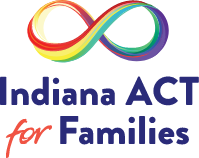Five Facts Policymakers Must Know: Medicaid Rate Revision for ABA Therapy
As lawmakers convene over the coming weeks to discuss Medicaid expenditures and ways to assist Hoosiers with intellectual and developmental disabilities, there is key information policymakers need to be aware of. These facts counter inaccurate claims the Holcomb administration has made regarding updated reimbursement rates for Applied Behavior Analysis (ABA) therapy.
1. FSSA Used Flawed Methodology and Ignored Their Own Cost Survey
- FSSA and OMPP’s provider cost survey found that the average cost to provide high-quality ABA therapy was $68.12 per hour for the 12 months ending June 2022. Adjusted for inflation, providers’ cost to administer ABA therapy is $76 per hour. The administration’s latest rate proposal of $68.24 blatantly ignores the results of their own cost survey data and is unsustainable for providers – ultimately leading to center closures.
2. FSSA Compared Indiana to States with Outdated Rates
- FSSA used a faulty comparison to ABA therapy reimbursement rates in other states to determine their updated rate proposal. Of the 18 states OMPP used for comparison with rates below $68.24, 1/3 of the states haven’t changed their Medicaid rates in the last 3 – 4 years and more than half haven’t been changed in over 18 months. As a result, these states could see an increase in the near future, which would increase the comparable states’ set average / median and put Indiana’s rate out of the range FSSA deemed to be “feasible” in its updated proposal.
3. Low Rate will Force Center Closures
- ABA therapy providers have faced high turnover among qualified therapists, which has lengthened waitlists for underserved children with autism. Even with wage increases of 20% or more, many ABA centers are still struggling with staff shortages, retention, and high burnout rates. Providers have been clear that significant rate cuts threaten their ability to provide services to families on Medicaid leaving many families fearful that they could lose access. These fears are not unfounded – providers have shut down in states like Colorado and Oregon due to Medicaid reimbursement rates that weren’t financially sustainable.
4. Public Schools Will be Overwhelmed By Influx of Children with Autism
- Cuts to ABA therapy would cause further strain on an already understaffed and under resourced school system. If ABA centers close due to unsustainable Medicaid rates, low-income families will be left with limited options for their child and will be forced to place them in a public school setting. Public schools do not have the funding or resources to support the influx of new students – midyear – who all need extremely specialized one-on-one services.
5. ABA Therapy Prepares Children for Independent Adulthood, Lowers State’s Long-Term Costs
- ABA therapy allows individuals with autism to live more independent lives and helps reduce reliance on more expensive state programs in adulthood. Providing this therapy, especially during the early years of life, which are critical for development, has been proven to result in better long-term outcomes and greater overall independence. Without ABA therapy, as a result of rate cuts, adults with autism will be heavily reliant on state programs for the entirety of their lives and have worse employment prospects. As of June 2023, there are nearly 135,000 unfilled jobs in Indiana. Meanwhile, 80% of people with autism are unemployed. ABA therapy can ultimately work to bridge the gap and equip children with autism with the skills necessary to become contributing members of society.
It’s clear that FSSA’s OMPP has demonstrated a failure to listen to families, therapists, and providers. Their proposed rate is not fair or sustainable and will eliminate lifechanging services for our most vulnerable Hoosiers. Providers have demonstrated unambiguous support for standardized rates, but OMPP’s updated rates are 30% below the current average reimbursement and below provider costs to operate. This significant cut to autism services will jeopardize access to high-quality autism services for over 6,000 Hoosier children with autism. Families are calling on policymakers to fight for a rate that keeps children in therapy and therapists employed.


